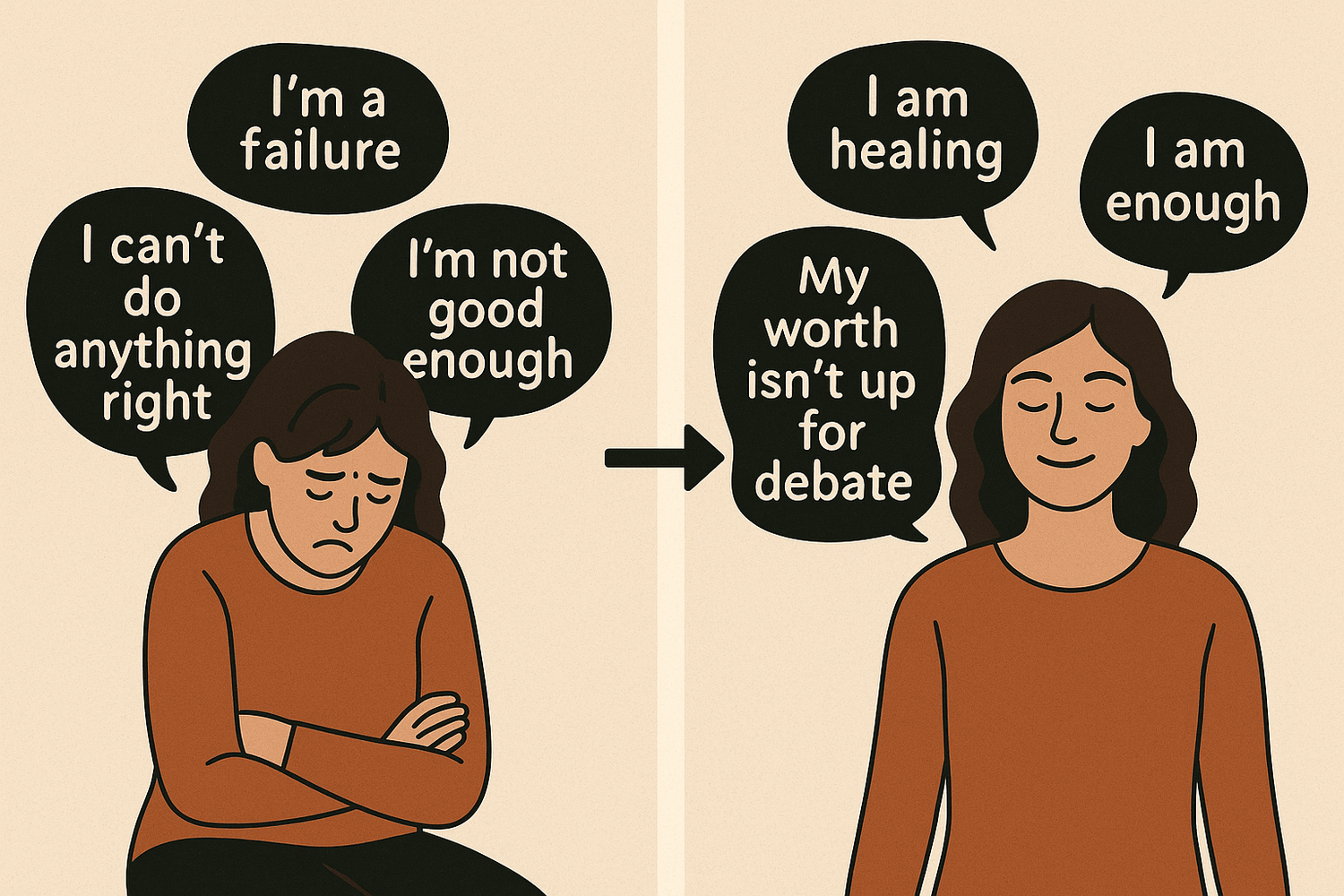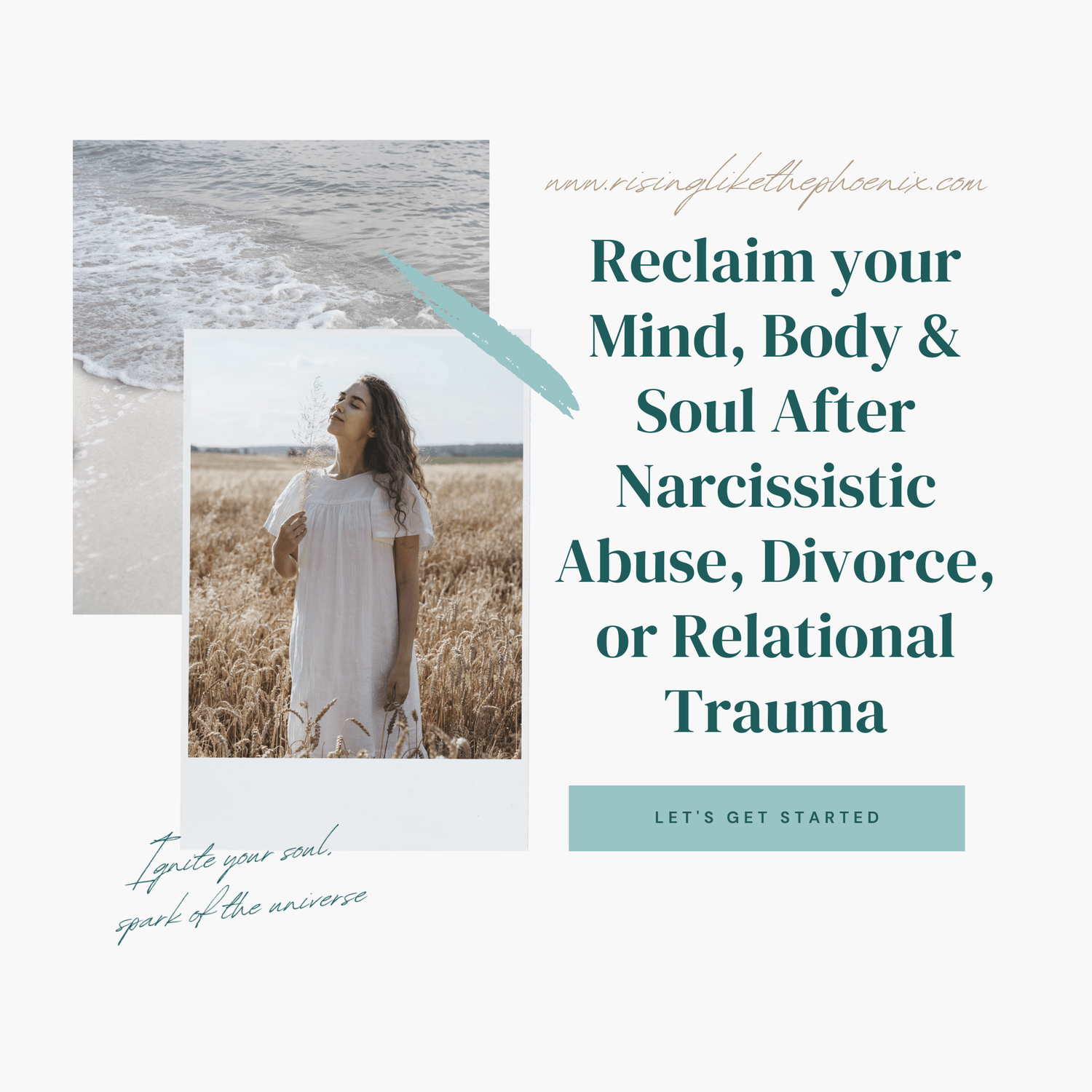How to Stop Negative Self-Talk and Reprogram Your Mindset
A guide to challenging limiting beliefs and developing a healthier internal dialogue
When you’ve survived narcissistic abuse or any form of relationship trauma, it’s not just the abuser’s voice that echoes long after the harm has passed, it’s your own inner critic that often picks up where they left off. The cruelest part? That voice doesn’t even belong to you. It was programmed, conditioned, and reinforced by gaslighting, manipulation, and emotional wounds.
But healing is possible. You have the power to reclaim your narrative, your self-worth, and your peace. This guide is your first-class boarding pass to understanding how negative self-talk forms, how it’s linked to narcissistic abuse recovery, and what recovery steps you can take to rewrite the script in your head, one grounded in truth, compassion, and healing.
Understanding the Origin of Negative Self-Talk
Our internal dialogue, the constant chatter in our minds, forms early in life and is shaped by the messages we receive from caregivers, authority figures, peers, and eventually, intimate partners. When you've experienced narcissistic abuse or toxic relationship trauma, your mind becomes a battlefield.
Gaslighting effects, emotional manipulation, and devaluation all chip away at your ability to trust yourself. You begin to question your thoughts, your memory, and your instincts.
Common Internalized Messages from Narcissistic Abuse:
“I’m too emotional.”
“I don’t deserve better.”
“It’s my fault they treated me this way.”
“If only I had tried harder…”
These limiting beliefs often masquerade as truth, but they are distortions, deeply rooted in someone else’s dysfunction, not your worth.
What Are Limiting Beliefs and Why Do They Matter?
Limiting beliefs are the unconscious thoughts and assumptions you hold about yourself, others, and the world. They act as invisible walls, shrinking your choices, muting your voice, and keeping you small.
Limiting Beliefs Sound Like:
“I’m not lovable unless I prove my worth.”
“I can’t trust anyone.”
“I’ll always attract toxic relationships.”
“I’m too old to start over.”
“People always leave me.”
These beliefs don’t reflect reality, they reflect past pain. But your nervous system, shaped by trauma, still responds to them as if they are absolute truths.
When your mind is constantly playing old tapes of self-judgment, it’s not surprising that confidence is low, joy feels unreachable, and anxiety is high.

How Narcissistic Abuse Fuels Limiting Beliefs
Let’s connect the dots. Narcissistic partners and caregivers are experts at identifying your vulnerabilities, and weaponizing them. Over time, this breaks down your inner knowing and replaces it with self-doubt, fear, and shame.
Their goal is control. The method? Repetition.
“No one else would love you.”
“You’re lucky I put up with you.”
“You’re too sensitive.”
When these statements are repeated during moments of vulnerability, they create emotional grooves, repeating loops in the brain that eventually become limiting beliefs. They affect your decisions, relationships, even your body language.
This is the hidden legacy of abuse, and it’s why recovery must include reclaiming your mind.
The Link Between Self-Talk and Self-Worth
Your internal dialogue is not just background noise, it’s a powerful influence on your healing journey.
Signs of Unhealthy Internal Dialogue:
Constant self-judgment or shame
Believing mistakes define your worth
Dismissing compliments or successes
Ruminating on past failures
Feeling unworthy of love or peace
When You Reprogram Your Mindset:
You reclaim your personal power
You rebuild self-trust
You cultivate emotional healing
You allow joy and love to take root
Learning to recognize and shift your self-talk is not about ignoring pain, it’s about honoring your truth and creating a more empowering narrative.
Step-by-Step Guide to Reprogram Your Mindset
Here are practical recovery steps to begin shifting that inner voice:
1. Identify Your Inner Critic
Get curious, not judgmental. When you notice negative self-talk, pause and write it down. Ask:
Whose voice is this?
Where did I first hear this message?
Is this a wound or a truth?
This is a powerful part of the healing journey. Awareness gives you choice.
2. Uncover the Root Belief
Go deeper. What belief is driving that thought?
Example: The thought “I’m not good enough” might come from a belief that “Love must be earned.” Once you identify the belief, you can challenge its truth.
3. Challenge the Thought
Ask yourself:
Is this thought absolutely true?
What is the evidence against it?
What would I say to a friend thinking this?
This practice builds self-compassion and emotional flexibility.

4. Replace with Truth Statements
Instead of sugar-coating, speak truth grounded in kindness:
“I am learning, and that’s enough.”
“I deserve to be treated with respect.”
“My feelings are valid.”
Post-it notes on mirrors. Affirmation cards. Phone reminders. You are retraining your brain with consistent repetition.
5. Create a “Reclaim Journal”
This is a sacred space to reframe negative thoughts into empowering ones. Write the lie. Write the truth. Write how it feels in your body to believe it.
Over time, this becomes a log of your rising.
Advanced Tools for Mindset Shifts
When you’re ready to deepen your healing, try these additional tools:
🔹 Somatic Awareness
Sometimes, limiting beliefs are stored in the body. Gentle practices like myofascial release, trauma-informed yoga, or grounding exercises can help release emotional residue from the nervous system.
🔹 Inner Child Work
Speak to yourself as if you were that little girl who was first told she wasn’t good enough. She needs safety. She needs grace. She needs you.
🔹 Cognitive Reframing
Work with a therapist or coach trained in CBT or EMDR to break negative thought loops and reinforce new mental pathways.
What Healing Looks and Feels Like
Healing is not about becoming someone new, it’s about remembering who you are beneath the pain.
Some days you’ll catch the thought and replace it.
Some days you’ll fall back into old habits.
Both are part of the process.
Every time you meet your pain with compassion, you change your life.
Every time you say, “That’s not true anymore,” you rise.
This is your rebirth. This is your truth.
FAQ: How to Stop Negative Self-Talk and Reprogram Your Mindset
Absolutely. It reinforces trauma, limits progress, and keeps you stuck in old emotional patterns. Changing it is essential for long-term healing.
Beliefs can be rewritten at any age. The brain is capable of neuroplasticity,meaning you can form new thought patterns with practice and patience.
Start smaller. Say things that feel emotionally true like “I’m doing my best” or “I’m open to healing.” Build from there.
Everyone’s timeline is different. With consistent effort and support, change can happen in weeks, but it’s often a lifelong journey of re-alignment and growth.
5 Steps to Reclaim Your Life
A practical guide to reclaiming your confidence, setting boundaries, and moving forward—without second-guessing yourself.

Hi, I’m Diane – and I’m so glad you’re here
Diane is the author of A Girlfriend’s Guide to the Other Side: Reclaim Your Mind, Body, and Soul After Narcissistic Abuse, Divorce, or Relational Trauma.
After surviving the wreckage of a controlling relationship that stripped her identity, she turned her pain into purpose. Through her book, course, and community, Diane now guides women on the journey of rebuilding self-worth, setting healthy boundaries, and reclaiming their lives.
Her mission is simple: to remind every woman that healing is possible, and that your future can be brighter than your past.
Categories
Rise Weekly Newsletter
Because healing isn’t just about surviving, it’s about rising. Rise Weekly delivers empowering insights, gentle reminders, and soulful tools to help you reclaim your strength, set powerful boundaries, and rebuild a life that feels like you. If you're ready to rise above trauma and step into your next chapter with clarity and courage - this is your space.
Created by © Suzanne Startari with systeme.io





